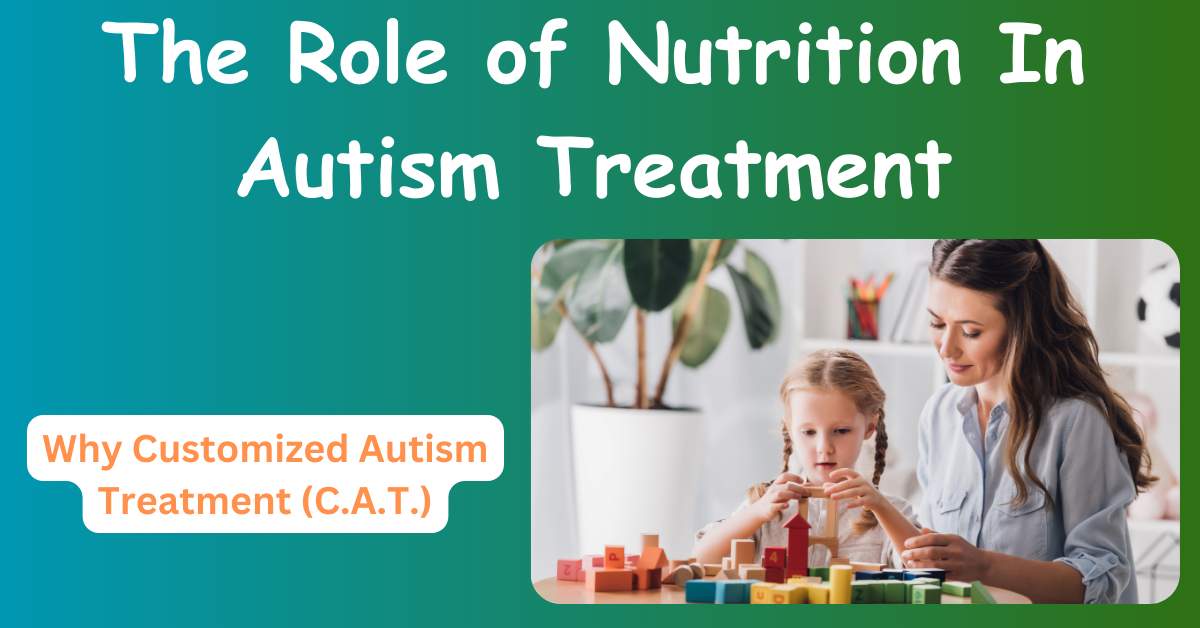The Role of Nutrition In Autism Treatment: A Closer Look At The Customized Autism Treatment (C.A.T.)

When it comes to treating Autism Spectrum Disorder (ASD), there isn't a one-size-fits-all approach. Each child with autism has unique needs, and finding the most effective treatment plan requires a personalized touch.
The Customized Autism Treatment (C.A.T.) approach aims to address this by focusing on individualized care, including the crucial role of nutrition in autism treatment.
In this blog post, we'll take a closer look at the importance of nutrition in the C.A.T. approach and how it can help children with autism.
1. The Customized Autism Treatment (C.A.T.) Approach:
C.A.T. is a comprehensive treatment plan designed to address the unique needs of each child with autism. By tailoring interventions and therapies to suit the individual, C.A.T. can help improve the overall effectiveness of autism treatment, leading to better outcomes for children and their families.
One key aspect of the C.A.T. approach is the focus on nutrition, which plays a vital role in the overall well-being of children with autism. Many autism treatment centers recognize the importance of nutrition in managing ASD symptoms and incorporate it into their treatment plans.
These centers often work with dietitians and other healthcare professionals to develop customized nutrition plans for children with autism, which may include specific vitamins for autism or other supplements.
By addressing nutritional needs as part of the C.A.T. approach, autism treatment centers can help children with ASD achieve better health and improved quality of life.
2. The Role of Vitamins and Supplements in Autism Treatment:
Some children with autism may have nutritional deficiencies or food sensitivities that can exacerbate their symptoms.
In such cases, incorporating the right vitamins for autism or other supplements into a child's diet can help address these issues and improve overall well-being.
For example, research has shown that vitamin B6 and magnesium supplementation may help improve social and communication skills in some children with autism.
Families can develop a customized nutrition plan that includes the essential nutrients their child needs for optimal health by working with a healthcare professional.
3. The Importance of a Balanced Diet:
In addition to vitamins and supplements, a balanced diet is critical for children with autism. A healthy diet can provide the necessary nutrients for proper growth and development and support brain function and immune health.
Parents should work with a dietitian or healthcare professional to ensure their child with autism is consuming a diet rich in fruits, vegetables, whole grains, lean proteins, and healthy fats.
This can help support overall health and improve the effectiveness of other treatments and interventions.
4. Addressing Food Sensitivities in Children with Autism:
Some children with autism may have food sensitivities or allergies that can impact their behavior and overall well-being.
Common food sensitivities in children with autism include gluten, casein (a protein found in dairy products), and artificial additives.
By identifying and eliminating these trigger foods from a child's diet, parents can help alleviate some of the symptoms associated with autism.
The C.A.T. approach highlights the importance of addressing food sensitivities as part of a comprehensive autism treatment plan.
5. The Impact of Nutrition on Behavior and Learning:
Proper nutrition can significantly impact a child's behavior and learning abilities. A well-balanced diet can help stabilize mood, improve concentration, and support overall cognitive function.
By addressing nutritional needs through the C.A.T. approach, parents can help their child with autism achieve better outcomes in both their daily lives and educational settings.
Conclusion:
The Customized Autism Treatment (C.A.T.) approach recognizes nutrition's vital role in treating Autism Spectrum Disorder.
By addressing individual nutritional needs, incorporating essential vitamins for autism, and working with autism treatment centers, parents can help their children achieve better health and improved quality of life.
If you have a child with autism, consider exploring how the C.A.T. approach can help address their unique needs and work with a healthcare professional to develop a personalized nutrition plan.

Add new comment